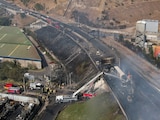The Taliban government's new law to "promote virtue and prevent vice" has codified their austere rules for Afghan society, dictating strict controls according to their vision of Islam.
In recent days there has been evidence of Taliban morality police enforcing the legislation, as well as Afghans self-policing to avoid conflicts with officials.
However, other elements are yet to be enforced and Taliban authorities have already been clamping down on behaviour they deem un-Islamic since surging back to power three years ago.
Here is what we know about the new law and its effect on society:
The new order
The text contains 35 articles. The most criticised dictates that a woman's voice should not be raised outside the home and that they should not sing or read poetry aloud.
Unrelated men and women are forbidden from looking at each other, and women are commanded to cover themselves entirely in front of non-Muslim women.
Men are ordered to grow beards longer than a fist, wear loose-fitting clothes and not reveal their bodies between the navel and the knee. Sodomy is banned "even with one's own wife".
The media has been banned from mocking or humiliating Islam, transport companies told to alter schedules to fit prayer times and Muslims told they should not befriend or help non-Muslims.
Some traditional games have also been banned, as well as taking or viewing photos of living things on computers or smartphones.
Disobedience of parents has also been outlawed.
Changes in society
Over the past two weeks since the law was announced on August 21, AFP has collected testimonies of increasing scrutiny by Taliban officials.
Enforcement is tasked to morality police from the Ministry for the Propagation of Virtue and the Prevention of Vice.
In the capital Kabul, patrol teams have given warnings to women travelling without a male "mahram" chaperone, and with part of their hair or hands showing.
A 23-year-old Kabul man said he was stopped three times.
"They asked me why I didn't have a beard. I was scared and promised them I would grow one," he told AFP.
In northern Mazar-e-Sharif, a taxi driver said he was "warned many times not to transport women without a mahram" or women not fully covered, and in central Parwan, women were chastised for not covering their faces.
In a Kabul bank, all the staff have swapped their western wear for traditional dress in a bid to comply with the new law.
However, this week, women's voices could still be heard on TV and radio stations.
Previous strictures
Since ousting US-led troops in 2021, the Taliban government has intermittently announced social curbs with an emphasis on separating men and women.
Many of those previous orders overlap with the new law and were already in effect.
Girls have long been banned from secondary school and women from universities. Women travelling were previously ordered to be chaperoned by a family member and to cover themselves from head to toe in public.
Prayer at set times has been deemed obligatory while music in public and gambling have been outlawed.
Segregation of men and women is already required in most public places. Adultery, homosexuality and drug addiction have also been previously banned.
However, the new document is the most comprehensive manifesto of the Taliban's vision for society since their return and outlines graduated punishments morality police can dole out.
They range from verbal warnings to threats, fines and detentions of varying lengths.
Grey areas
The law announced by the largely opaque Taliban government leaves many questions unanswered.
It says women should only leave home for an "urgent need", but does not outline what situations they deem urgent.
With friendship and assistance to non-Muslims banned, it is unclear whether Afghans are banned from working with international organisations -- a major lifeline for the economically bedraggled country.
It may also imply the Taliban government themselves are forbidden from dealing with western nations, further cementing their pariah status. And it's unclear how media on phones and TV will be policed.
But perhaps the largest question is how uniformly and rigorously the new law will be enforced.
A United Nations report in July said there were "ambiguities and inconsistencies" around morality measures and their enforcement before this new law.
(Except for the headline, this story has not been edited by NDTV staff and is published from a syndicated feed.)















